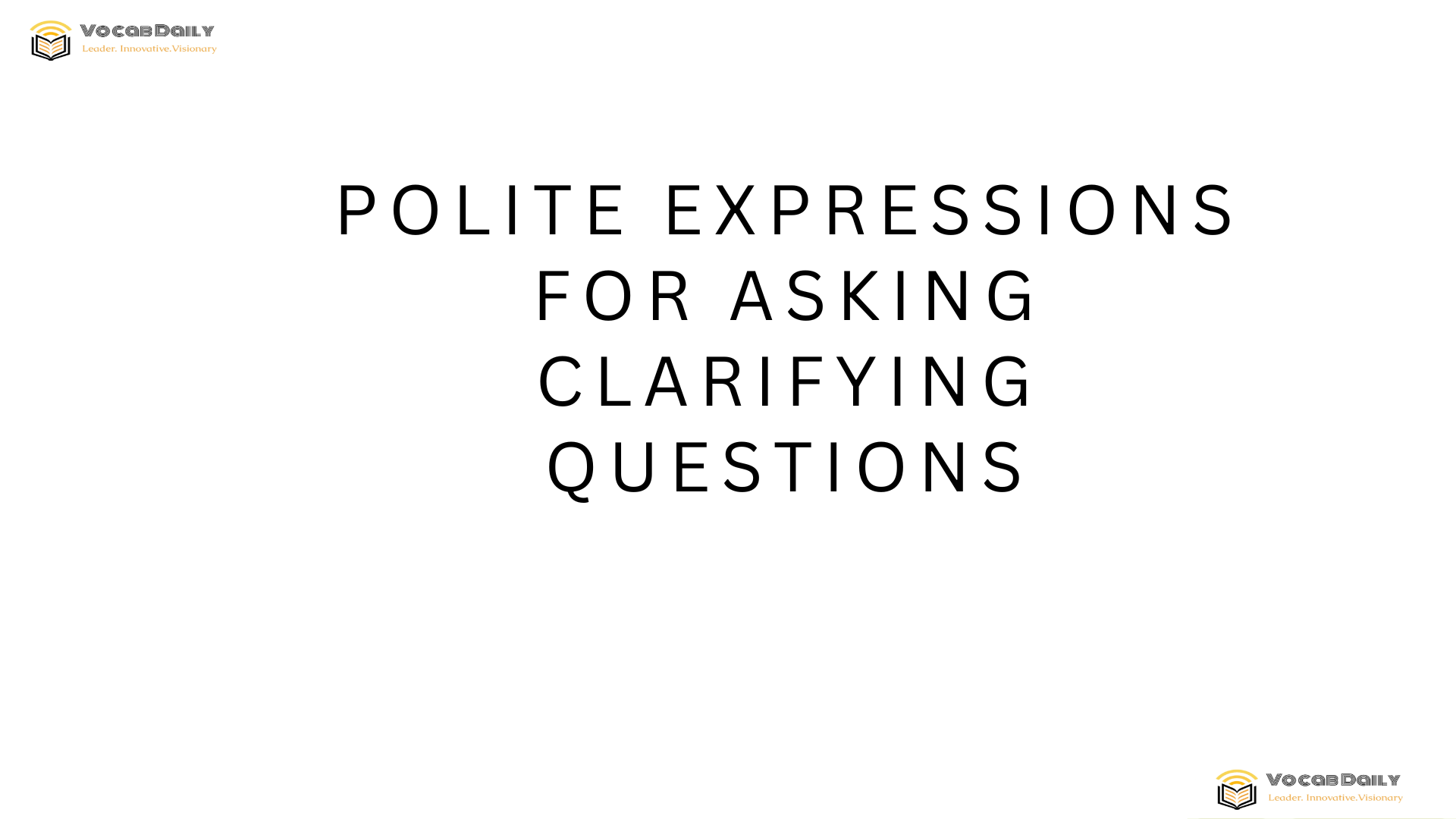Polite Expressions for Asking Clarifying Questions
In job interviews, effective communication is key to making a positive impression. One important aspect of communication is the ability to ask clarifying questions politely. Clarifying questions ensure you fully understand the interviewer’s points and demonstrate your attentiveness, critical thinking, and professionalism. This article explores various polite expressions for asking clarifying questions in the context of job interviews, helping you navigate conversations confidently and respectfully.
Why Asking Clarifying Questions Matters in Job Interviews
When you’re in a job interview, clear understanding is essential. Sometimes, questions or statements from the interviewer may not be entirely clear or might need further elaboration. Instead of guessing or remaining silent, politely asking for clarification helps avoid misunderstandings. It also shows that you are genuinely interested in engaging fully with the conversation.
Moreover, clarifying questions give you time to collect your thoughts before answering. This can result in more thoughtful and precise responses, which benefits the overall impression you leave. Therefore, mastering polite phrases to ask clarifying questions can improve your communication skills and increase your chances of success.
Polite Phrases to Open a Clarifying Question
It’s important to start your request for clarification with a polite phrase that shows respect toward the interviewer. Here are some commonly used expressions:
- “Could you please clarify…”
- “I’m not sure I understand completely. Could you explain…”
- “Would you mind elaborating a bit more on…”
- “May I ask for some clarification regarding…”
- “If you don’t mind, could you please expand on…”
- “Could you help me understand…”
Using these openings ensures you come across as polite and professional. They signal that you value clear communication and are making a careful effort to understand the question properly.
How to Politely Seek Specific Information
Sometimes you need to ask for particular details rather than general clarification. Here are some ways to do so respectfully:
- “Could you provide an example of what you mean by…”
- “Would it be possible to get more details about…”
- “Could you specify what you’re referring to when you say…”
- “Can you tell me more about the expectations for…”
- “I would appreciate if you could elaborate on…”
These expressions request additional information without sounding demanding or impatient, which is especially important in a formal interview setting.
Clarifying Timeline or Process Questions
Interviewers often mention processes or timelines related to the role or company. If you need clarification on these points, try these polite questions:
- “Could you please clarify the timeline for the project?”
- “Would you mind explaining the typical process for…”
- “I’m interested in understanding the workflow better; could you elaborate?”
- “Could you tell me more about how the team coordinates on this?”
- “Can you clarify the next steps after this stage?”
Showing an interest in workflow and timelines indicates your systematic mindset and eagerness to align with company procedures.
Expressing Polite Doubt or Seeking Confirmation
Sometimes, you might want to confirm your understanding of what was said. Polite doubt or confirmation phrases include:
- “If I understand correctly, you’re saying that…”
- “Just to confirm, do you mean that…”
- “Am I correct in thinking that…”
- “I want to make sure I’m following you. Are you suggesting that…”
- “Could you confirm whether…”
These phrases show that you are carefully listening and actively engaging with the information, which is highly valued in interviews.
Nonverbal Tips When Asking Clarifying Questions
Polite language needs to be supported by appropriate nonverbal cues. Here are a few nonverbal tips that accompany asking clarifying questions:
- Maintain eye contact to show you are fully engaged.
- Use a friendly tone that sounds curious rather than confrontational.
- Nod occasionally to indicate you are following the conversation.
- Pause briefly before speaking to avoid interrupting.
- Smile gently to create a positive impression.
Nonverbal communication reinforces your respectful and professional approach when seeking clarification.
Practice Examples of Clarifying Questions in Job Interviews
Here are examples of polite clarifying questions you can use in different interview scenarios:
- About job responsibilities: “Could you please clarify what the daily responsibilities for this position would involve?”
- Regarding company culture: “Would you mind elaborating on how the team collaborates on projects here?”
- Discussing performance expectations: “May I ask for some clarification on the key performance indicators used for this role?”
- On training and development: “Can you provide more details about the training programs available to new employees?”
- About the interview process: “Could you clarify the next steps in the hiring process, please?”
Using these question formats, adapted to your specific context, will help you communicate clearly and professionally.
The Benefits of Polite Clarifying Questions in Interviews
Asking polite clarifying questions has multiple benefits. First, it helps you avoid misunderstandings that could lead to poor answers or confusion. Second, it demonstrates your communication skills, showing you can engage in a conversation respectfully and thoughtfully. Third, it allows you to gather more precise information, giving you a better chance to tailor your responses appropriately.
Interviewers appreciate candidates who listen actively and ask relevant questions. It reflects positively on your interpersonal abilities and indicates you would actively contribute to team communication. Ultimately, mastering polite expressions for clarification can enhance your confidence and improve your overall interview performance.
Additional Tips for Using Clarifying Questions Effectively
To make the best use of polite clarifying questions during your job interview, consider these additional tips:
- Listen carefully: Pay close attention to the interviewer before asking a question to avoid unnecessary repetition.
- Be concise: Keep your clarifying questions brief and to the point.
- Choose the right moment: Don’t interrupt; wait for a natural pause before asking.
- Express appreciation: Thank the interviewer after they provide clarification.
- Practice beforehand: Rehearse common clarifying phrases and scenarios to build your confidence.
Applying these tips will ensure your questions sound natural and respectful throughout the interview.
Also check out VocabDaily workbook collections.

Leave a Reply